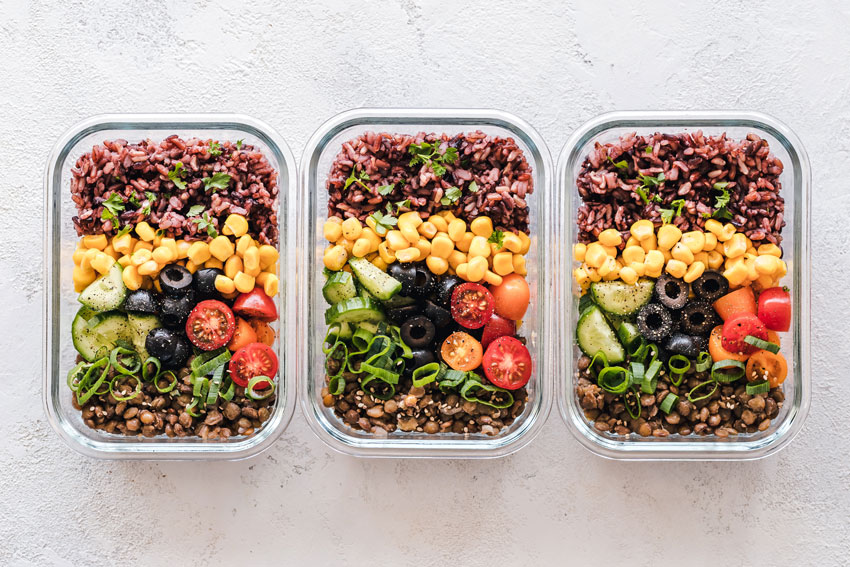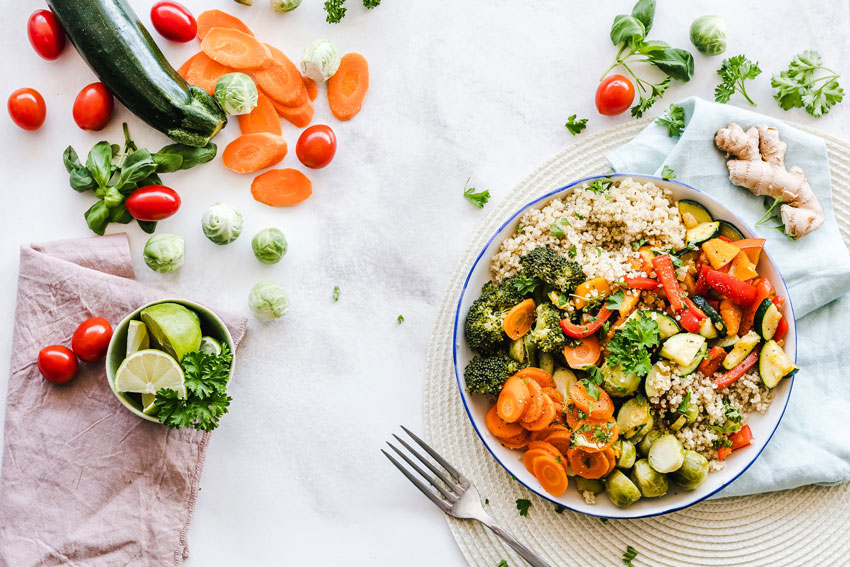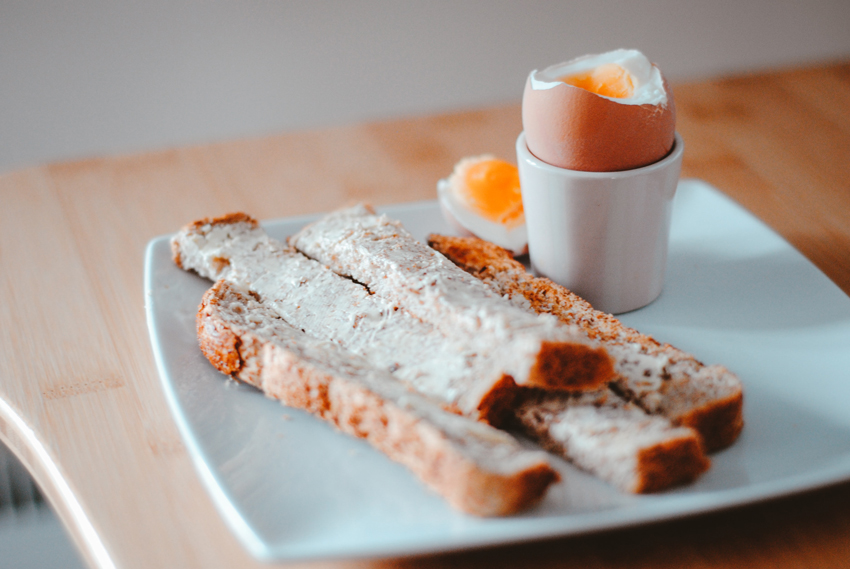Diet and weight management go hand in hand together to help you to make long-lasting lifestyle changes that can positively affect your health and reduce your risk of certain cancers and illnesses.
Although the word “diet” can sometimes invoke images of eating bland or less favourable food to lose weight, the word actually means “the kinds of food that a person, animal or community habitually eats”.
Diets shouldn’t just be about your total calorie intake, but they should also be enjoyable, balanced, and include foods that you enjoy.
There are so many different elements to our diet that we have to think about, but as humans, we’re more likely to actually stick to a diet plan if it’s enjoyable and provides us with enough nutrients to keep us full and satisfied without reaching for sugary snacks or fatty foods.
It’s incredibly important to involve your diet as part of your weight management plan, even if you’re taking medications to help you to lose weight.
This is because our diet is a part of our lifestyle, and if we’re able to make positive and sustainable changes to it for the good of our health, then it’s an opportunity that should be seized with both hands.
A managed and balanced diet can help you to keep excess weight off even after you’ve finished any treatment plans.

With myBMI, we offer dietary support as well as medical therapies to help you with your weight loss, as we acknowledge that the key to success with maintaining a healthy weight is making small and manageable changes.
What are calories?
A calorie is a unit of energy, which is most commonly used when talking about food intake and diet.
As humans, we get most of our energy through dietary calories and we need them to function.
Our bodies use energy for every daily bodily process, and they use more when we exercise or increase our physical activity.
In order to stay healthy, we need to make sure that our calorie intake is equal to how much energy we use each day.
Most things that we eat or drink has a calorific value, and if you buy pre-packaged foods such as sandwich meats, cereals, tinned foods and many other packaged consumables, you’ll usually find the nutritional information on its packaging.
This is sometimes measured per portion instead of the whole pack, so make sure you double-check the labels to make sure that you know how many calories you’re going to be eating if you plan on having more than one portion.

Calories are often talked about in a weight-loss context, but they’re important for everyone to learn about, as they’re one of the few things that affect all humans, regardless of background or environment.
Our diet is where we get calories from, and we can choose where they come from.
For example, foods that are higher in fat will usually contain a higher amount of calories than those that are rich in protein or carbohydrates.
If you’re a very active person who needs to eat more calories that’s the average person, then you may choose to incorporate more fat into your diet.
However, for most people, a balanced and measured diet that correlates with how much energy we burn is the best option for a healthy lifestyle.
Calories are also known as kilocalories, or kcal, which you’ll often see on food packaging as a way of telling you how many calories a product contains.
It’s important to take notice of this information and where most of the calories in our food come from, as consuming too many calories over a prolonged amount of time can cause weight gain.
This is because the extra energy is stored within the body, sometimes as fat cells.
Guideline daily amounts of calories, sugars, fats, saturates and salt
To help us keep to a balanced diet that suits the needs of an average adult, the NHS and government have published recommended daily amounts of calorie intake.
They also recommend guideline amounts of various food groups such as fats, carbohydrates, sugars, salts and protein.
In terms of fruit and vegetables, we’re encouraged to eat as much of them as possible, so these aren’t routinely mentioned in the nutritional values on food packaging.
Guideline amounts are just that – a guideline to live by.
They aren’t set rules, and each individual has different needs.
For example, if you have a sedentary lifestyle you’ll perhaps need to adjust your calorie intake to suit your day to day life, but as a general guide, the official guidelines for daily nutrition in adults is as follows:
- Calories – 2000
- Fat – less than 70g
- Of which saturates – less than 20g
- Carbohydrates – at least 260g
- Total sugars – 90g
- Protein – 50g
- Salt – less than 6g
You may notice that it’s recommended to have far more of some nutrients than others.
This is because nutrients like protein have more nutritional value than sodium or fat – both of which have the potential to cause certain health conditions if consumed in excess.
Whilst these guidelines are great to start with they may not apply to everyone.
For example, people with type 2 diabetes or polycystic ovary syndrome may find it difficult to eat the recommended amount of carbohydrates in one day and still lose weight due to the way that they can metabolise in the body.
However, if you need to follow a certain diet plan due to any underlying health conditions, you should be referred to a dietitian or nutritionist by your GP to receive specialist advice on what you should be eating each day to maintain a healthy body.

Some people with obesity find that they eat more than the recommended amount of calories each day over a period of time.
This can accumulate and contribute to weight gain over a prolonged amount of time.
It doesn’t always make much difference either.
If you ate just 200-300 calories more than you need each day, this excess energy builds up in your body and can often be stored as fat.
Sometimes, this is because of resistance to a hormone called leptin – which helps to reduce your appetite, particularly after a meal.
It’s important to know where our calories come from so that we can plan what we eat each day to stick to a recommended amount of calories.
For example, one gram of protein contains 4 calories – the same as one gram of carbohydrates.
However, the same weight of fat contains more than double the calories of protein and carbohydrates, coming in at 9 calories.
Because of this, we must choose our calories from sources that are going to provide satisfaction and fullness, so choosing plenty of fruit and vegetables, protein and carbohydrates is a winning combination for a healthy meal.
Fats are still important though and should be consumed in moderation.
Intermittent fasting
Intermittent fats is another phrase that’s gained popularity in recent years, with many people including celebrities endorsing certain diet plans. But what exactly is it?
First off, let’s take a look at fasting.
Fasting is the practice of restricting food intake or abstaining from it.
It has roots in many religions but is also used within nutrition and diet to combat the over-consumption of calories.
Intermittent fasting means cycling between periods of eating, and restriction or abstinence.
There are many variations of intermittent fasting diets, with some fasting for periods each day and others fasting for an entire day or two per week.
Other types of intermittent fasting reduce the number of calories you consume on some days whilst keeping a regular diet for the rest of the time.
Some of the most popular methods of intermittent fasting are:
16/8 – You fast (eat nothing) for 16 hours each day, so you only have a window of eight hours to eat your calorie allowance for the day. For example, someone may choose to eat between the hours of 12 pm-8 pm each day.
Eat/Stop/Eat – eating a normal diet with all of your recommended daily nutrients and calories, but fasting for 24 hours once or twice a week.
This means that you then reduce your weekly calorie intake by roughly 4000kcal, which can lead to weight loss over a period of time.
5:2 – possibly the most well-known method of intermittent fasting is the “5:2 diet”. The 5:2 plan sees you eat normally for five days a week, and then restrict your calorie intake for the remaining two days.
These days usually have a limit of 500-600 calories.
In some ways, it’s similar to the eat/stop/eat method, but instead of completely stopping any food intake, you’re just reducing it by 75% for those two days, which should reduce your weekly calorie intake by roughly 3000 (if going by the recommended daily calorie allowance for adults).
Most methods of intermittent fasting don’t exclude any food groups like other diet plans, so some find it easier to stick to than plans that eliminate sugars or carbohydrates, as cravings and withdrawals don’t tend to happen as often.
This is especially relevant if you choose a method of intermittent fasting that lets you restrict food rather than abstain from eating.

Intermittent fasting can certainly reap benefits for some people, as it’s a fairly easy way of reducing your calorie intake over a long period of time whilst still keeping a fairly normal diet.
However, as with any diet or nutritional plan, intermittent fasting won’t suit everybody.
Some people may have underlying conditions or have medications that need to be taken with food, so if you’re unsure about whether intermittent fasting is right for you, you should speak to your GP or dietitian about the benefits and drawbacks of each method and what it could mean for your health.
One challenge when it comes to intermittent fasting diets is the fact that it can be difficult to control hunger cravings on days when you restrict food intake.
If you do choose to follow one of these plans, you should make sure that you don’t overcompensate for any hunger on your restriction days, as this may undo any benefits of following an intermittent fasting plan.
Does eating breakfast help you lose weight?
Many people believe that breakfast is the most important meal of the day, and that to be successful at losing weight, you must eat breakfast every day, but is this actually true?
Breakfast indeed gives us energy for the day as it means that we start consuming calories within an hour or so of waking up.
However, this doesn’t mean that it can help you to lose weight.
As we already know, the relationship between body weight and calorie intake has to do with the amount of energy that you use in comparison to how much you consume – not with the time of day that you eat.
Our bodies use different amounts of energy for different tasks, and most surplus energy is stored, ready to use at another time, for example after a workout.
But if you aren’t hungry at breakfast, and you aren’t about to go and do some extreme sports, then what should you do?

Generally speaking, our bodies are really good at telling us when they need fuel.
This is why we become hungry because levels of certain hormones tell us when we need to eat.
If you don’t feel hungry in the morning or feel like you struggle to eat breakfast, then there’s no need for you to force a meal down.
It may be beneficial to have a small, healthy snack if you start feeling peckish before lunchtime, but with modern lifestyles being more sedentary and requiring fewer calories than humans 60 years ago, there’s no great need to have breakfast if you don’t want to.
For example, if you’re following the 16/8 method, you’ll usually have to choose between breakfast or an evening meal, and those on the 5:2 intermittent fasting plan may not have enough calories on their restriction days to allow for breakfast.
When it comes to mealtimes, you should listen to your body, and consider what works for your lifestyle.
As long as you’re eating the right amount of calories to maintain a healthy weight, it shouldn’t matter much if you skip breakfast or not.
However, if you do decide to skip breakfast, you should make sure that when you do become hungry, you don’t end up over-compensating for missing a meal by eating fatty foods or more calories than you need.
If you are hungry in the mornings and do decide to eat breakfast, low GI (glycemic index) foods such as fruits, vegetables and whole grains may be a good option for you as these can stave off hunger cravings better than foods with a higher glycemic index.
Very low-calorie diets vs low-calorie diets
A low-calorie diet is a nutritional plan that involves eating between 1000-1200 calories per day – almost half of the recommended daily allowance for adults.
This may be recommended to people that are obese and need to lose weight, as a reduction in daily calorie intake of around 600kcal can help you to lose around 1lb a week on average (depending on several factors).
However, low-calorie diets are designed to still be sustainable, as most of the calories usually come from proteins, fruits and vegetables.
Low-calorie diets are sustainable for a while but generally aren’t recommended as a long term diet plan.
However, it can be helpful for people that have previously had bariatric surgery or are taking medications that reduce appetite, as 1000-1200 calories in these instances can be enough to satisfy you and give you the energy that you need without giving you more calories than you need.
A very low-calorie diet, on the other hand, is a diet plan that only allows you to eat 800kcal per day – which is around 1,200 fewer than the recommended daily allowance for adults.
A very low-calorie diet is not sustainable for a prolonged amount of time and doesn’t often allow you enough energy for you to cope on a long term basis.
A very low-calorie diet is usually only recommended for those that are obese or severely obese and have a pressing medical reason to lose weight quickly.
This rapid decrease in caloric intake allows for faster weight loss, for example, if someone needs to reduce their weight for surgery or a procedure.
Diets of just 800kcal per day are usually monitored by specialists and are only recommended for a maximum of 12 weeks.
If you have been recommended a low-calorie diet by a healthcare professional, but find that you’re struggling with hunger, then you may want to consider looking into options that can help with appetite suppression.
At myBMI, we offer a consultation to anyone that’s wanting to lose weight, and if our weight loss specialists believe that you could benefit from medical treatment, they will prescribe medication for you to take, which would be included in the price of the consultation.
Some medical treatments that we offer include certain injections or tablets that can help to reduce your appetite and keep you fuller for longer, which may make it easier to follow a low-calorie diet.
















